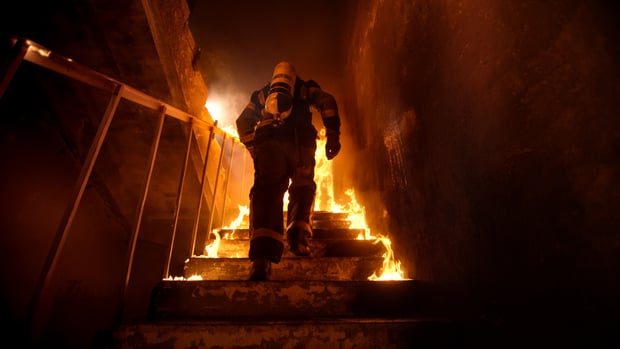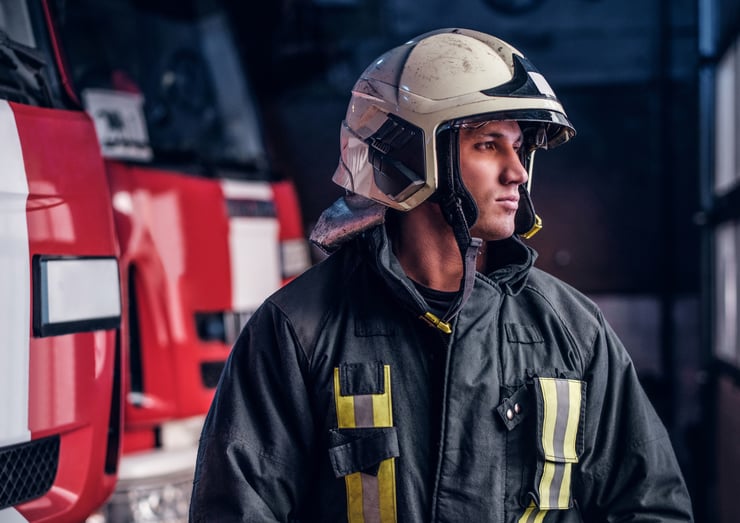A firefighter job search is challenging, as you already know. You must be both physically and mentally prepared for this role, plus have the required training and experience. If you have made it to the interview process, congratulations!
Now you need to make this last “push” to secure the job. We’ve put together this list of firefighter interview questions and answers to help you succeed.
What Skills Do Firefighters Need?
Firefighters need a combination of technical knowledge, physical capabilities, and soft skills to be effective at their jobs. Some departments also expect you to demonstrate certain leadership capabilities.
As you interview, be sure to draw the employer’s attention to these skills:
- Publicly safety knowledge
- Spatial awareness
- Strong communication skills
- First aid knowledge
- Manual dexterity
- Emotional resilience
- Understanding the properties of fire
- Knowledge of safety regulations
- Mechanical aptitude
- Equipment operation
- Search and rescue operations
What Questions Are Asked in a Firefighter Interview?
Most firefighters get asked a mix of general questions about their professional background, paired with situational, problem-solving, and behavioral interview questions. The interviewer would likely want to assess your motivation for joining the service, your ability to handle stress, and your overall fit with the crew. Some may also ask questions to assess your work ethic and character.
This post will cover some of the most common firefighter interview questions you should practice answering.
1. Why Do You Want to Join the Fire Service?
Think of this as a “filter” question. The fire service is a job that sometimes attracts people who want to enter the field for the wrong reasons (e.g. due to having a hero complex or being an adrenaline junkie). People with the wrong temperament or motivations can be a danger to themselves or others.
Answer this question honestly, but focus on the community service aspects, opportunities, and teamwork of the job.
Example answer:
“I’ve always been interested in pursuing a job that allows me to help people. When I was working as an EMT, I had the opportunity to work directly with the fire service quite frequently. I noticed the teamwork and camaraderie as well. It’s that combination of factors that motivated me to attend the fire academy.”
2. In your opinion, What are Three Important Qualities a Firefighter Needs?
The point of this question is to better understand what you prioritize in your own work and professional development. To nail it, cover a range of attributes that demonstrate your sense of responsibility and work ethic.
Example answer:
“First, I believe that people in the fire service have to pay close attention to detail. Missing a small prep step or failing to notice a tiny change in the environment or the rescuee condition can be deadly. Secondly, I think firefighters should be very procedural. There are times when we simply have to follow our training and step through the right procedures for a given situation without any hesitation. Finally, I think firefighters must value teamwork and effectively interact with everyone else present on the scene — EMTs, police, the general public, etc.”

3. Why Do You Want to Leave Your Previous job?
“Why are you leaving your current job?” is a common interview for all positions, firefighting jobs included. Chances are, the interviewer wants to learn about your temperament and how you will speak about a former employer. Focus on the positive here. Leave out any drama or bad blood. This isn’t the time to vent your spleen.
Example answer:
“I learned a lot at my job and got to work with some amazing people. I’m proud of the lives we saved and the property damage we were able to mitigate. However, as you know I recently completed my Bachelor of Science degree in public administration. I pursued that so I could advance into a leadership role. That isn’t possible at my current firehouse, at least not for several years. So I’ve decided to consider other opportunities on the job market”
4. What Steps Have You Taken To Emotionally Prepare For This Job?
This is another firefighter interview question to determine whether you are able to properly handle the stress and trauma exposure, associated with this profession. Your goal is to demonstrate high emotional intelligence and explain what healthy coping mechanisms you have.
However, you don’t need to go into too much detail either. Oversharing could be a mistake. Keep your answer short and professional.
Example answer:
“I have always treated my mental health as a priority. I have a good support system with my friends and family. I have also completed a course for first responders on recognizing signs of PTSD and mental exhaustion. Once these kick in, I usually practice meditation or book a therapy consult. Overall, I’m committed to pursuing help if needed in addition to having good coping skills”.
5. How Do You Cope With Stress and Tough Mental Situations?
It is absolutely imperative that a firefighter stays composed in stressful situations. Someone who freezes up, panics, or becomes needlessly aggressive can make a bad situation worse. Naturally, the interviewer wants to know how you maintain yourself in high-risk and high-pressure situations.
If you are new to the service, think of an example where you remained calm in a dangerous situation. Use this to describe your mental process.
Example answer:
“I stay calm and on task by employing a few different techniques. First, I use mindfulness to keep myself focused on my surroundings and aware. I also participate in all drills and voluntary training. This keeps my skills sharp and ensures I know the next step to take in any situation. Finally, I am self-aware enough to know when I need to step away and have an alternate step in for me. It doesn’t bruise my ego to say I need a break or some extra help.”
6. Can You Provide an Example of Efficient Teamwork From Your Last Job?
Good firefighters are solid team players. They understand that a well-coordinated group response is crucial for effective risk containment. To achieve great synergy, firefighters must have solid interpersonal skillsincluding active listening, clear oral communication, patience, and persuasion. Demonstrate some of these in a short story from your last job.
Example answer:
“A few months ago we were called out to conduct a water rescue operation. About an hour into things, the winch we were using snapped. Within five minutes of that occurring, we had created and begun to execute an alternative plan. We made arrangements with a local tow company to use one of their winches. Then, we called out two firefighters from another station who had scuba equipment and water rescue training. They were able to swim out to the people in the car, ensure they were stabilized, and keep them calm. I am very proud of the teamwork we displayed as well as the support we received from a private citizen and another fire company.”
7. Did You Ever Have to Work Outside of Provided Instructions? How Did You Approach The Task?
For the most part, a firefighter should follow orders and procedures. They are mandatory to keep everyone’s safe. These tend to be time-tested regulations that are often delivered by people with years of experience.
That said, you should also exercise critical thinking skills and common sense. This means recognizing when a situation may have changed, then applying your skills and knowledge to make a decision backed by good judgment. You want to show you can think independently.
Example answer:
“Yes, there have been several times when I have had to make a decision on the spot that contradicted the initial plans or instructions I received. This has generally happened when conditions in a fire or rescue situation change very quickly. There isn’t time to seek permission from a Lieutenant to do something different. Instead, the best approach is to make the decision that will have the best outcome. I am very grateful that my superiors have always been supportive and given me some level of autonomy.”
Even More Common Firefighter Interview Questions to Practice
Below are several supplementary questions you might get asked during the interview:
- How do your friends and family describe you?
- How would you rate your current physical strength?
- Did you ever take part in any rescue operations (professionally or unprofessionally)?
- How would you respond to conflicting orders on the scene?
- Are there any other roles in the Fire Department you might be interested in?
- What have you done so far to prepare for the firefighting role?
- How flexible is your work schedule? Would odd shifts be a problem for you?
- How would you deal with a distressed, but aggressive citizen on the scene?
How Do You End a Firefighter Interview?
Before your firefighter interview ends, you may be asked if you have any questions. If so, your answer should always be “yes”. By preparing and asking questions after an interview, you demonstrate your sincere interest in the role, plus show that you have done some research. Ask about recent events or plans that may be in store for the fire company. Of course, you should also ask questions about the specific position or the rest of the hiring process.
Finally, end the conversation with a compelling interview closing statement. Reiterate your excitement about joining the service. Ask what needs to be done to move the process along, and if there are additional questions you can answer. No matter what, thank them for their time. You want to end things in an upbeat way because you never want to burn bridges. Even if this position isn’t guaranteed to you, another could be in the very near future.






